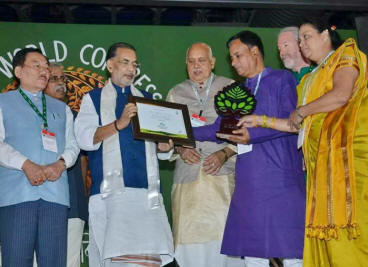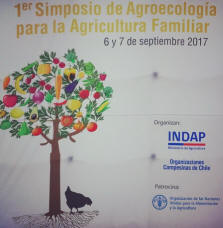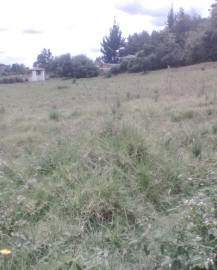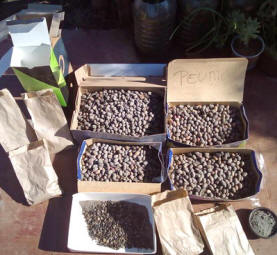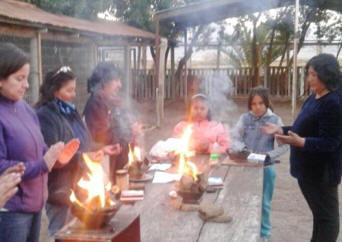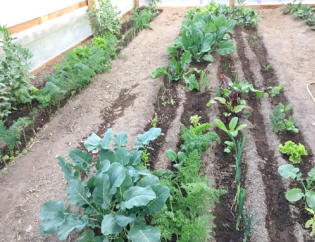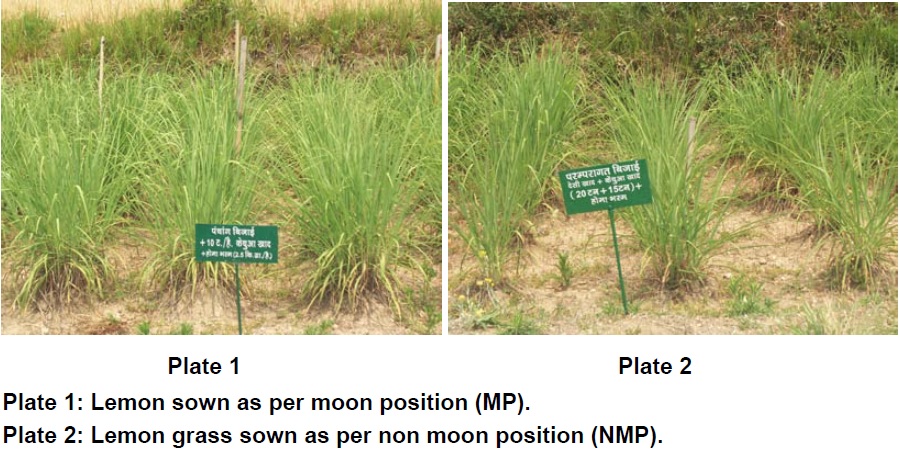|
Williams Antonio Mundini Chirinos |
 |
|
I am 63 years old and I am originally from Venezuela. Last year I started with the practice of Homa Therapy, which I came to know through Mr. Ricardo Mena and his wife Christa. After doing Agnihotra several times on the small farm, we got 12 chicks. Normally they do not hatch eggs and they did not do it in 3 years until I started practicing the Homa Fires. His wife confirms: We were told that these chickens genetically could not hatch, but in the wake of the Homa fires they started hatching eggs. |
|
Abhay Mutalik Desai Receives Dharti Mitra National Award for Organic Agriculture, New Delhi, India
|
|||
Irma Castillo, Region of Antofagasta, Chile, Receives Recognition from Agro-Ecological Symposium
|
Award for Development of Homa Ecological Agriculture in First Symposium for Family Agriculture
|
|||
|
|||
Homa Farm Tenjo, Colombia – A Paradise On Earth
|
|||
|
It is very easy to imagine what this farm was like 40 years ago, if you look at the photo of the land next to it. (photo right) This farm was the same; arid, dry soil without a single flower, without a single tree. There was absolutely nothing growing. Continue reading “Homa Farm Tenjo, Colombia – A Paradise On Earth” |
Organic Certification for ‘Satsang’ Homa Farm, Curacaví, Chile
|
Satsang is part of the Organization of Organic Producers of Curacaví |
||
|
Irma Castillo, Calama Valley, Antofagasta Region, Chile
|
Mrs. Irma Castillo, a small farmer from the Calama Valley, Antofagasta Region, Chile, has been involved in organic farming programs since 2013. One year ago, she came to know about the Homa Farming Super-technology. And from that moment she started with the discipline of the Agnihotra Fire on her farm. Here she has an exclusive place to practice the fire, which is located next to the greenhouse. Everything produced in this place is for family consumption. She applies concepts of functional diversity, practices daily at sunrise and sunset the Agnihotra Fire and applies Homa bio-fertilizers, such as Agnihotra Ash solution, Agnihotra ash directly on the soil and sprays the Homa bio-fertilizer Gloria Biosol. With this, Mrs. Irma produces the necessary vegetables, herbs, etc. for her family and friends to whom she gives freely from her production. |
|||
|
|||
The Effect of Organic Treatments on Lemongrass (Cymbopogon citratus)
PreambleAn experiment was conducted at the Model Organic Farm of CSK Himachal Pradesh Agricultural University, Palampur (31º54’ N and 76º17’ E), Himachal Pradesh, India, to evaluate the effect of various organic management treatments on the productivity and quality of lemon grass (Cymbopogon citratus). Organic inputs (viz. farm yard manure (FYM); vermicompost; agnihotra ash; and neem powder) were added at the time of planting, while Bt + Himbio and the biodynamic preparation BD 500 were sprayed regularly at one month intervals. Crops were sown on dates matching moon and non moon position according to the Biodynamic Planting Calendar. Addition of agnihotra ash along with sowing as per moon position resulted in a higher yield of lemongrass (+124%, +99%) and a higher oil per cent (+155%, +144%) over the control, in both the years of study. Sowing as per moon position may have improved germination rate, water absorption and metabolism of the plants, whereas addition of agnihotra ash may have stabilized the nutrients present in soil. |
Biochemical Efficacy of Homa Organic Farming Practices in Okra (Abelmoschus esculentus)
An investigation was carried out at Main Agricultural Research station, University of Agricultural Sciences, Dharwad, Karnataka during monsoon season 2012, to study response of okra (Abelmoschus esculentus var. Arka Anamika L. Moench) to Homa Organic Farming practices.
PreambleA field experiment laid out in completely randomised block design with 18 treatments replicated thrice was conducted during monsoon season 2012 to study the biochemical efficacy of Homa organic farming practices in okra (Abelmoschus esculentus var. Arka Anamika). |
|
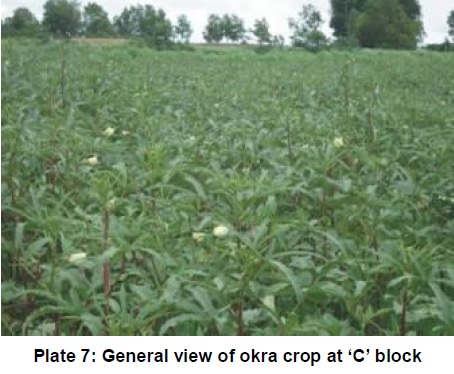 |
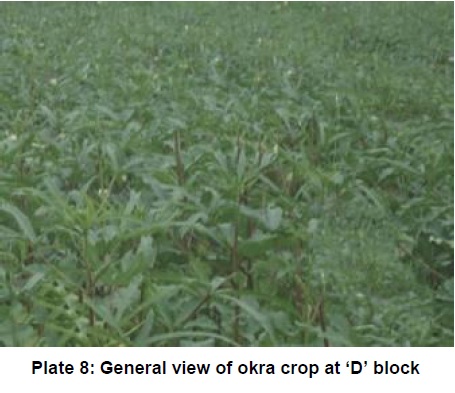 Continue reading “Biochemical Efficacy of Homa Organic Farming Practices in Okra (Abelmoschus esculentus)” Continue reading “Biochemical Efficacy of Homa Organic Farming Practices in Okra (Abelmoschus esculentus)” |
Biochemical Studies on Homa Organic Farming Practices in Cabbage
An investigation was carried out at Main Agricultural Research station, University of Agricultural Sciences, Dharwad, Karnataka during monsoon season 2010, to study response of cabbage (Brassica oleracea var. Saint) to Homa Organic Farming practices.
PreambleA field experiment laid out in Completely Randomised Block Design with 13 treatments replicated thrice was conducted during monsoon 2010 to study the biochemical studies on Homa organic farming practices in cabbage (Brassica oleracea var. Saint).
|
|
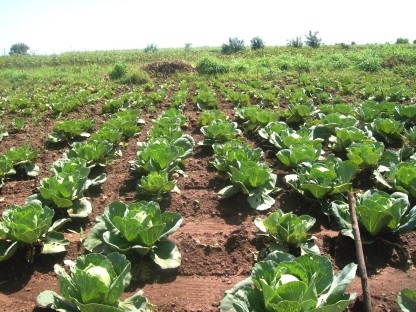 General view of cabbage field in C-block (Homa) |
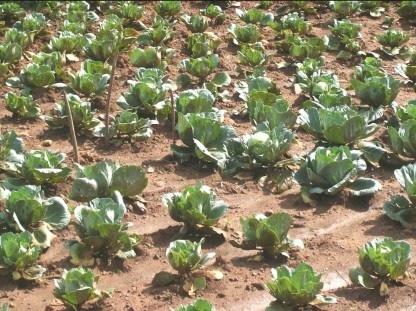 General view of cabbage field in G-block (Control) Continue reading “Biochemical Studies on Homa Organic Farming Practices in Cabbage” |
Response of Tomato to Homa Organic Farming Practices
An investigation was carried out at Main Agricultural Research station, University of Agricultural Sciences, Dharwad, Karnataka during kharif season 2010, to study response of tomato (Solanum lycopersicum L.) to Homa Organic Farming practices.
PreambleThe field experiment was laid out in completely randomised block design with 11 treatments exposed to Homa atmosphere replicated thrice.
|
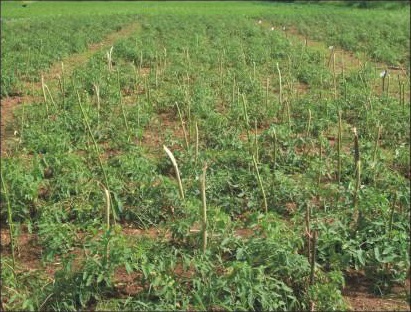 |
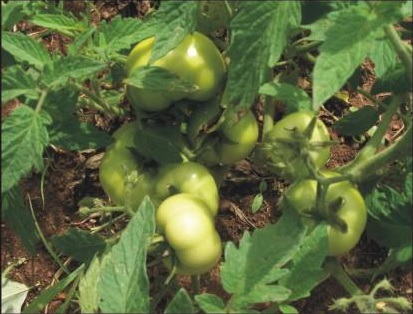 Continue reading “Response of Tomato to Homa Organic Farming Practices” Continue reading “Response of Tomato to Homa Organic Farming Practices” |


